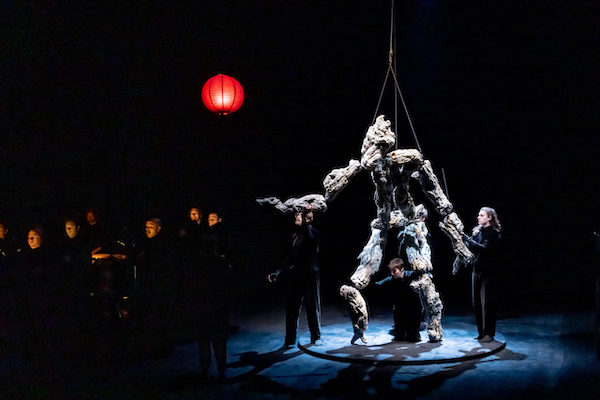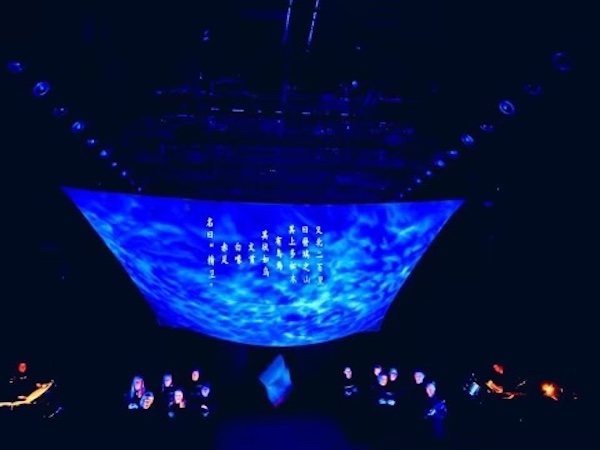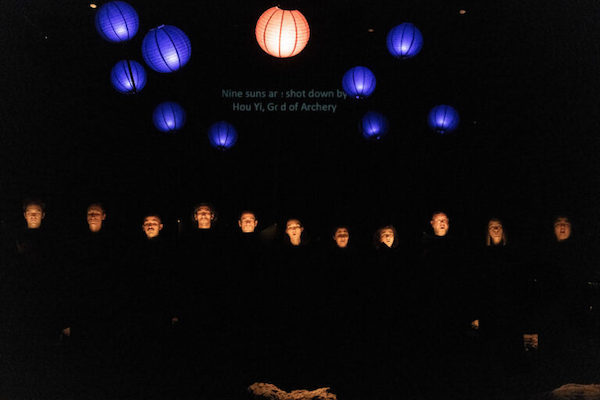Theatre Preview: A Chat with Basil Twist — Poetry Wins in “Book of Mountains and Seas”
By Debra Cash
You either go full Hollywood CGI, or you pare it down to the poetry of it.

A scene from Book of Mountains and Seas. Photo: Teddy Wolff
A hairy giant called Pangu hatches from a shell and separates the egg’s parts — white and yolk, yin and yang — to create the earth and sky. When he dies, his bones become the mountains, his breath becomes the wind, and his blood becomes the rivers and seas. His left eye becomes the sun, his right eye the moon.
This creation myth is a famous episode from Shanhaijing, a Chinese classic first transcribed in the 4th century BCE. Depicting the story, according to MacArthur-winning puppeteer Basil Twist, offers one of two options: “You either go full Hollywood CGI, or you pare it down to the poetry of it.”
In Basil Twist’s imaginative world, poetry always wins.
Book of Mountains and Seas is a collaboration between Twist, composer/librettist Huang Ruo, Toronto Percussion, and the 12 singers of Ars Nova Copenhagen. Retelling four tales from this ancient compendium in the light of Anthropocene climate change, Book of Mountains and Seas portrays human beings’ hubris and our incessant efforts to control nature, with apocalyptic consequences.
Arts Emerson presents the work at the Paramount Center April 19-21.
It was almost derailed by the global pandemic. Twist had traveled to Copenhagen to begin developing imagery for a production that would suit a concert hall, incorporating input from the singers. But after the pandemic shutdown, what began as a relatively standard international enterprise became a logistical predicament. The six puppeteers developed the work under Twist’s guidance in New York (and puppetry, Twist notes, is an art that does not lend itself to social distancing). The singers rehearsed Huang’s idiosyncratic score, with lyrics in both Mandarin and in a language the composer made up, in Copenhagen. The percussionists worked in parallel in Toronto. Because Scandinavia reopened for live performances far earlier than the US, the work premiered in Denmark in the fall of 2021 but delayed its New York premiere until the spring of 2022. An abbreviated US tour is underway and I caught up with Twist by Zoom from Los Angeles.

A scene from Book of Mountains and Seas. Photo: Teddy Wolff
Both Huang Ruo and Basil Twist are steeped in the legacy of artistic families. Huang, who was born on Hainan Island and grew up in Guangzhou not far from Hong Kong, is the son of composer Huang Ying-sen, who composes primarily for film and television.
His father started him on piano at the age of six. As Huang Ruo told National Endowment for the Arts director of music and opera Ann Meier Baker in 2020,
We had a recital and I was supposed to play a piece I’d memorized by J.S. Bach. I had terrible stage fright and my teacher said, “Just don’t stop. Keep playing!” So when I had a memory lapse at the recital, I just improvised Bach-style for a few measures until I found my way back. My piano teacher told my father that she didn’t think his son was going to be a pianist, but he might be able to write music.
Huang attended the Shanghai Conservatory, his father’s alma mater, from age 12 through his early teens. He came to the United States — after a crash course in English — in 1995, earning a bachelor’s degree at Oberlin, followed by study at Juilliard. He was the first-ever composer in residence at the Concertgebouw in Amsterdam and is a member of the composition faculty at the Mannes College of Music at the New School in New York. He has written in a range of formats, from ensembles that combine Western instruments and classical Chinese ones to opera, in a fusion form that he calls “dimensionalism.”
Basil Twist is a third-generation puppeteer. His grandfather, Griff Williams, was a big band leader in Chicago the 1930s and ’40s who built marionette versions of Cab Calloway and Harry James and “invited” them to conduct his ensemble. (Twist used some of the family puppets for his Arias with a Twist and donated his grandfather’s collection for a permanent exhibit at the HERE Arts Center in New York.)
His mother Lynne followed in her father’s puppetry footsteps, founding a group of amateur puppeteers who performed at hospitals and schools in San Francisco. Growing up, Twist made puppets out of found objects like L’eggs pantyhose containers and returned to puppetry as a college student. He became the only American to have graduated from the three-year program at France’s national school for puppeteers in Charleville-Mézières.

A scene from Book of Mountains and Seas. Photo: Teddy Wolff
In 1998, he created his landmark — and still controversial — Symphonie Fantastique. In this abstract production, a team of puppeteers in wet suits dragged colored fabrics through a 1000-gallon aquarium where colors bloomed, floated, and were whisked away in time with Berlioz’s music. I saw this in New York at the time, and some audience members mocked it as resembling washing on a spin cycle. Others, me included, thought the puppet abstractions of Symphonie Fantastique made for a cheeky, mesmerizing visualization of the overwrought 1830 score. Twist’s later Broadway credits have included puppet elements for The Pee-wee Herman Show and The Addams Family. Even within narrative constraints, his distinctive style remains one of fluidity and shape-shifting.
Twist and Huang were introduced by Nigel Redden at the Spoleto Festival in Charleston, South Carolina, who thought their sensibilities would mesh in interesting ways. Their paths crossed again when Neil Wallace, director of The Big Sing choir festival in the Netherlands, invited Twist to come to Denmark for a project he was doing with the 12-piece vocal polyphonic ensemble Ars Nova Copenhagen.
As he explains it, the puppet design of Book of Mountains and Seas has been pared down to three elements:
I use silk. I use silk in a lot of my work. We use paper lanterns because they are in the air, have a Chinese flavor. Then the third element is these pieces of driftwood. Driftwood is a hard element, the silk has fluidity, and the lanterns are more celestial. We combine them on stage to tell the different stories, and there’s a humility and a sparseness to it — and then finding the beauty and the elegance of that.
In general, I’m sort of a maximalist where I like to throw lots of stuff in and if the music changes I wanna change the color and I wanna change what’s happening: and it’s fast paced and stressful for the performers to keep up.
This was different. Because the music doesn’t want me to do that. The music wants me to stay in a more meditative space as the music is revealing itself.
We bring our inner worlds to something as simple as silk and driftwood and a paper lantern. The magic [of puppetry] has always been the invitation of the audience to participate in the enormous mystery of something coming to life. And it becomes something enormous and epic and universal.
Debra Cash is a Founding Contributing Writer to the Arts Fuse and a member of its Board. She first experienced the work of Basil Twist in 2002, when the Jacob’s Pillow Dance Festival presented his version of Stravinsky’s Petrushka, a meta-puppet show about a puppet show.
Tagged: Basil Twist, Book of Mountains and Seas, Climate Change, Huang Ruo, Puppets

Hey Debra, Great article about Basil Twist. I’m a follower of his. Lucky you had the chance to interview him. Hoe I get to see Mountains and Seas.